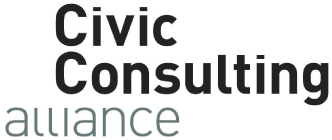
Creating a more equitable recovery: addressing the economic barriers for Chicago women

Enhancing museum campus as a global, year-round destination
August 31, 2022
Ensuring safer communities through effective collaborations
March 14, 2023Creating a more equitable recovery: addressing the economic barriers for Chicago women

Civic Consulting Alliance was called on by the Chicago Mayor’s Office to support the Mayor’s Women Advisory Council to analyze the impact of the ‘she-cession,’ a gender gap in employment rates and pay in Chicago that was worsened by the COVID-19 pandemic. The final report, “Creating a More Equitable Recovery: Addressing the Economic Barriers COVID-19 Exacerbated for Women in Chicago,” provides decision-makers with recommendations to center women’s economic recovery in their planning and policies.
Addressing Gender Disparities in the Workforce
Women, and even more so women of color, were disproportionately negatively impacted in the workforce by the COVID-19 pandemic. In order to have an equitable recovery, policymakers, workforce development practitioners, and employers need to address the systemic inequities in our labor market. The significant resources available through the federal American Rescue Plan Act (ARPA) offer an opportunity to center women in the region’s economic and workforce development recovery strategies.
To address this disparity, the Chicago Mayor’s Women’s Advisory Council formed a working group to understand the impact of the pandemic on women in the workforce, and identify initiatives and policies that the City of Chicago, employers, and workforce development organizations can undertake to facilitate financial success for women.
Civic Consulting Alliance provided project management support to the working group including Mayor Lori E. Lightfoot’s Women’s Advisory Council (WAC), World Business Chicago, and Women Employed.
Meeting an Ambitious Timeline
The working group was charged with an ambitious timeline to develop recommendations, rooted in a deep data-driven analysis; socialize the findings with a number of stakeholders; and release the recommendations in a public-facing report and event.
Civic Consulting Alliance was well-versed in facilitating collaboration against tight deadlines. “Our goal in this work was to provide strong project management,” said Julie Habbert, Senior Associate at Civic Consulting Alliance. “Everyone was at the table in a meaningful way to push this work forward, but it’s helpful to have an outside person pulling the pieces together to hit milestones and deliver a timely report.”
Our team helped prepare “data walks” with over 60 stakeholders to engage in dialogue around research findings. Stakeholders included the Mayor’s Office, labor unions, partners at the State of Illinois, workforce development organizations, and nonprofits to share the data in advance of the final report. These “data walks” served two purposes: to capture ideas for recommendations that could be used in the report, and to build momentum with stakeholders who could influence change for women in the workforce.
As the report began to come together, our team assisted with the preparation of the report and the launch event to ensure that it formed a cohesive narrative that would help inform decision-makers across sectors on recommendations to improve women’s workforce opportunities.
“Civic Consulting Alliance helped bring key stakeholders along for the journey to understand and act on the data. The final recommendations and solutions presented in the report will help ensure Chicago works toward an equitable economy that benefits all.”
– Darci Flynn, Director of Gender-based Violence Strategy & Policy, Office of the Mayor, City of Chicago
Decision Makers Now Have the Data to Center Women’s Economic Recovery
In June 2022, the working group released its full report, “Creating a More Equitable Recovery: Addressing the Economic Barriers COVID-19 Exacerbated for Women in Chicago,” through a virtual launch event.
The report lays out data showing that working women, and especially Black and Brown women, were already economically vulnerable before COVID-19, and that the pandemic exacerbated this existing economic divide. Key takeaways include:
- Women in Chicago were more likely to be single head-of-household, and yet they were also less likely to be working in 2020.
- When they were working, women were earning much less than their male counterparts, and they were overrepresented in low-quality, low-wage jobs with fewer benefits.
- Women also experience significant economic insecurity due to caregiving responsibilities, both for their own children and for parents or extended family.
- Many industries negatively impacted by the pandemic – including healthcare, food service, hospitality, and educational services – are women-dominated.
- 36,000 women in Chicago dropped out of the labor force from 2019 to 2020, compared to just 11,000 men.
The working group’s report and recommendations will help decision-makers center women in their recovery plans, which could include: City allocation of ARPA workforce development funds; City economic recovery policy; and private businesses’ employment practices.
